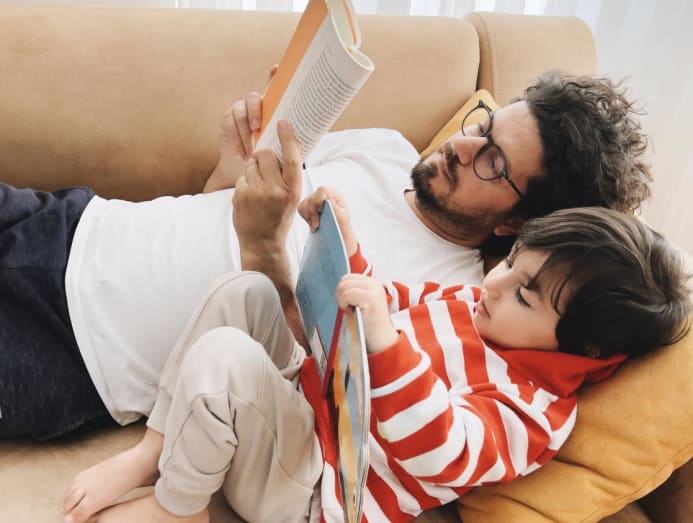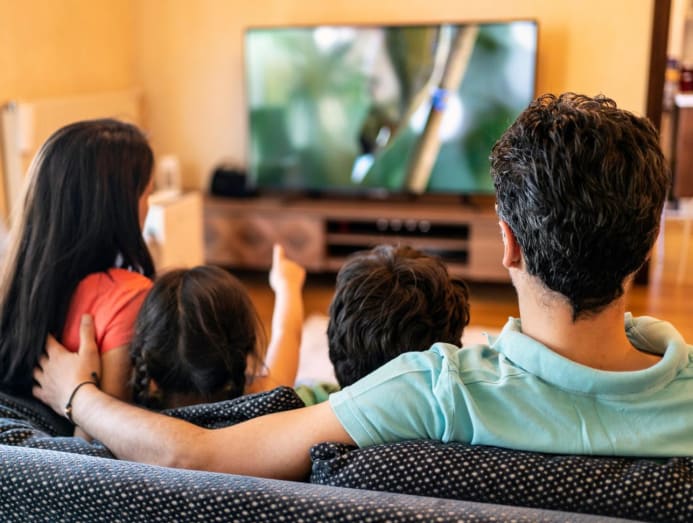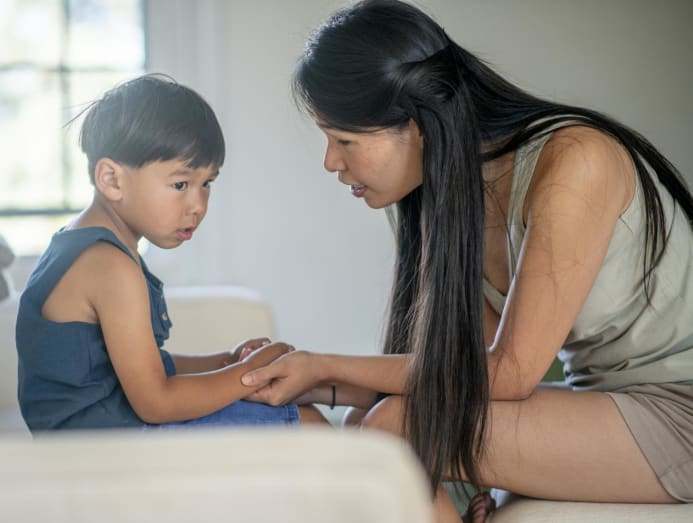Did your parents skip the sex talk with you? Experts’ tips when your child asks: ‘Where do babies come from?’
More than half of sexually active young adults in Singapore have the wrong ideas about conception and sexually transmitted infections. Find out what age-appropriate tips the experts have when the subject matter is brought up.

(Photo: iStock/imtmphoto)
Think you know all about the birds and the bees? Here’s a pop quiz: Can a women get pregnant if she has unprotected sex during her period? If a man pulls out before ejaculation, can the woman get pregnant? Can you still catch a sexually transmitted infection if you didn’t have penetrative sex?
Surprisingly, a significant number of sexually active young adults in Singapore got the above questions wrong (if you’re wondering, the correct answer to all is “yes”). This was from an August 2022 Durex survey that involved 400 young people in Singapore aged 18 to 29.
Of the lot, the 51 per cent that said they were sexually active (they engaged in sex as often as every few months to every day) were more likely to have misconceptions about sex.
Case in point: The survey further found that 20 per cent of these respondents believed that pregnancy can be avoided if a woman has sex standing up as gravity will prevent the sperm from travelling upwards.

WHY DO MISCONCEPTIONS PERSIST?
Never mind that your parents probably didn’t give you the birds and the bees talk, but isn’t the right information available online? Why do these misconceptions still persist?
“While there is an abundance of information that would disprove those myths, there is also an abundance of articles that spread them – and might have been the source of those beliefs in the first place,” said John Shepherd Lim, the founder and chief well-being officer of Singapore Counselling Centre.
“Some examples of informational sources for the younger generation these days come from online forums and threads as well as TikTok or web articles that are not evidence-backed.”
Psychiatrist Dr Lim Boon Leng from Gleneagles Hospital sees the phenomenon as a sign that more should be done about sex education in Singapore. “Many of these myths have been perpetuated even before the age of the Internet. The fact that these misconceptions persist would signal that sex education is not sufficiently provided to our youths and the general public.

“I feel that most parents do not discuss the topic of sex as it is taboo. They do not deliberately leave it to teachers but rather, sweep it under the carpet and assume their children will come of age,” he said.
Annabelle Chow, a clinical psychologist with Annabelle Kids, sees a 50-50 situation in her practice: “In my experience, approximately half of the parents I come into contact with will discuss the topic with their children. Others may leave it to educators or other professionals”.
MORE HARM THAN GOOD WHEN THERE IS NO DISCUSSION
These experts’ observations coincided with the results of a 2020 survey on understanding parents’ views on sex education in Singapore by AWARE and research agency Blackbox. More than 500 respondents were involved. It found that 43 per cent of parents were uncomfortable discussing sexual health with their children.
The reasons given included embarrassment or a lack of confidence, lacking the appropriate tools to begin the conversation, and the worry that the discussion would encourage their children to have sex.

“We are glad that almost three-quarters of parents do not associate discussing sex with their children with wanting to try it,” said Shailey Hingorani, the head of research and advocacy at AWARE.
“After all, comprehensive sexuality education, which presents information in a factual rather than moralistic or alarmist manner, has been found to produce the outcomes that most parents desire: Youths start having sex at a later age, have fewer sexual partners, use condoms more consistently and contract sexually transmitted infections less often.”
However, Hingorani said that “it’s worrying that only around half of parents feel comfortable discussing these core topics with their children”.
As a result, the lack of information can initiate a cascade of issues. “When I see young patients with unplanned pregnancies, there usually have not been prior discussions (about sex),” said Dr Susan Logan, a senior consultant with National University Hospital’s Division of Reproductive Endocrinology and Infertility, Department of Obstetrics and Gynaecology.
Chow added that “parent-child communication is important as it increases contraceptive use and reduces the impact of sexually transmitted infections. Communicating frequently and clearly about this topic can help to keep children safe”.
IS IT THE PARENTS’ OR TEACHER’S JOB?
The experts that CNA Lifestyle spoke to agree that it’s both the job of parents and teachers. “Teachers can provide a more technical or factual approach,” said Dr Lim. “For example, what is sexual intercourse and how babies are conceived, the types of contraceptives, addressing myths and misconceptions.
“Parents are the ones who have to educate children on the value or morals behind sex,” he continued. “There is no standard right or wrong – and it will not be fair for teachers to have to address this. Every family has different beliefs, values and views on sex and only the parents can educate their children on what they think is ethical.”

In fact, parents should begin their children’s sex education much earlier, said Chow, such as teaching them about the various body parts and their functions. “The parental role is to build a safe bond with their children to be able to openly communicate about sex, and to educate and inculcate the idea of personal boundaries and the concept of consent.”
Chow added: “Parents who outsource sexual education solely to teachers will miss the opportunity to have deeper conversations with their children and the chance to build rapport and inculcate values”.
Lim agreed that parents are better positioned to have deeper conversations with their children. “At school, students may be reluctant to voice questions in front of their peers. However, at home, they might feel more comfortable directing their questions to their parents.
“Having heart-to heart conversations with parents on sensitive topics is often better than leaving children to learn from online sources,” said Lim.

DON’T ASK, DON’T TALK?
What if your child has not initiated the “talk” at all? Does that mean he or she has all the information and you’ve dodged the bullet?
“Children need to be armed with the right information in order to protect themselves and to also understand the consequences of sex,” said Dr Lim. “This is especially important if parents want to impart their value systems to their children.”
As for why your child isn’t asking you about where babies come from, there can be various reasons, said Lim. “First, they could be too young to be interested in the topic; second, they could be curious but feel uncomfortable about bringing up the subject; third, they could be getting their information elsewhere.”
To take the pressure off parents about the “talk”, Chow said it doesn’t have to be “one huge talk”. Lim agreed: “Parents can capitalise on teachable moments, for example, when the topic is brought up in television shows or the news”. And “especially when children are starting to date or enter puberty”, he said.

Here are the age-appropriate ways, according to the experts, to discuss the birds and the bees with your child:
Ages two to five
Teach your child about his or her reproductive parts – and use the correct words for them instead of childish slang and immature words, said Chow. For instance, say “penis” or “vulva” rather than “wee wee”.
This is also a good age to teach children that private parts are private – and no one should touch or ask to touch them, other than parents and doctors for the appropriate purposes, said Dr Lim.
Children in the younger range of this age group may ask “where do babies come from” out of a mere need to satisfy their curiosity, said Lim. “It is crucial for parents to not dismiss their children or overreact when they ask questions.” At this stage, parents can introduce concepts such as physical affection, family and love.
Older children around ages four to five can be introduced to books such as It’s Not The Stork, So That’s How I Was Born and Mummy Laid An Egg to explain things to them, recommended Lim and Dr Logan.

Ages six to eight
Children of this age group can handle more information, so you can talk about the biological process of sexual intercourse and how babies are made, said Chow. “If your child is close to beginning puberty (it can start as early as ages eight in girls and nine in boys), talk about the expected changes.
“If your child does not bring up any topics, you can bring up the topic of reproduction or puberty by asking them what they think about it,” she said
Most children of this age group would be in school and are often away from their parents, so encourage your child to “build and maintain boundaries”, said Lim.
“Let your child know that not everyone can have equal access to his or her body, as well as parts that others should never touch. It is also helpful to let them know how they can respond if their physical boundaries are crossed.”

Ages nine to 12
Your child is likely to be going through puberty and it can be of significant help to talk about topics such as menstruation, erections and the effects of hormonal changes, said Lim.
“Explain what types of changes your child can expect and invite him or her to ask questions,” said Chow. “Validate that the experience can be difficult and share your own experiences if appropriate.”
This can also be the time to emphasis on hygiene and safety during your discussions, said Dr Logan.
If you’re not sure, Lim suggested websites such as HealthHub for practical tips on the parental guidance you can provide. There are also webinars that parents can sign up for, such as this upcoming one on Nov 12.
Ages 13 onwards
The early teenage years are when your child is “more rebellious” and “a more collaborative approach will be helpful”, said Dr Lim.
“Parents can bring up a hypothetical scenario and through listening to how the child approaches the scenario, understand his or her understanding of sex as well as values or views on sex. Again, based on the family’s values, parents can then educate and beef up that which may be lacking," he said.

At this age, a good understanding of contraceptives and the proper prevention of STIs are a must, emphasised Dr Lim.
Teenagers are often exploring their sexual identity at this age and they may struggle to speak with their parents about sex, particularly if the parents had unintentionally or intentionally imposed their own views on their child, said Lim.
“Parents should ensure a fair and open exchange of opinions with their children when broaching issues on masturbation, rape, pornography and the development of romantic relationships,” he said, suggesting the AWARE website Sex Ed: Declassified to help users navigate topics such as sexual orientation and sexual health.
Dr Logan advocated teaching teens about consent and protecting themselves against peer pressure and relationship violence. She also highlighted that parents of "special" children should take note that those with learning and physical disabilities are at higher risk of abuse and assault. “It is important that they are not left out of discussions on appropriate touching, talking to strangers etc.”







